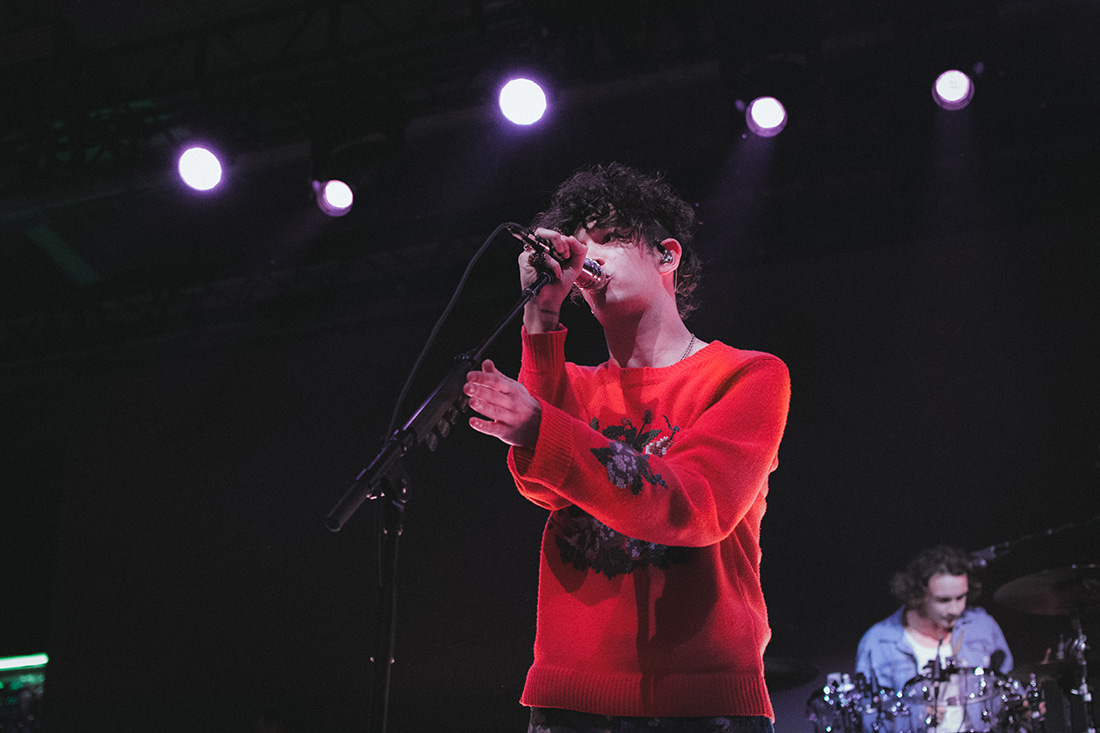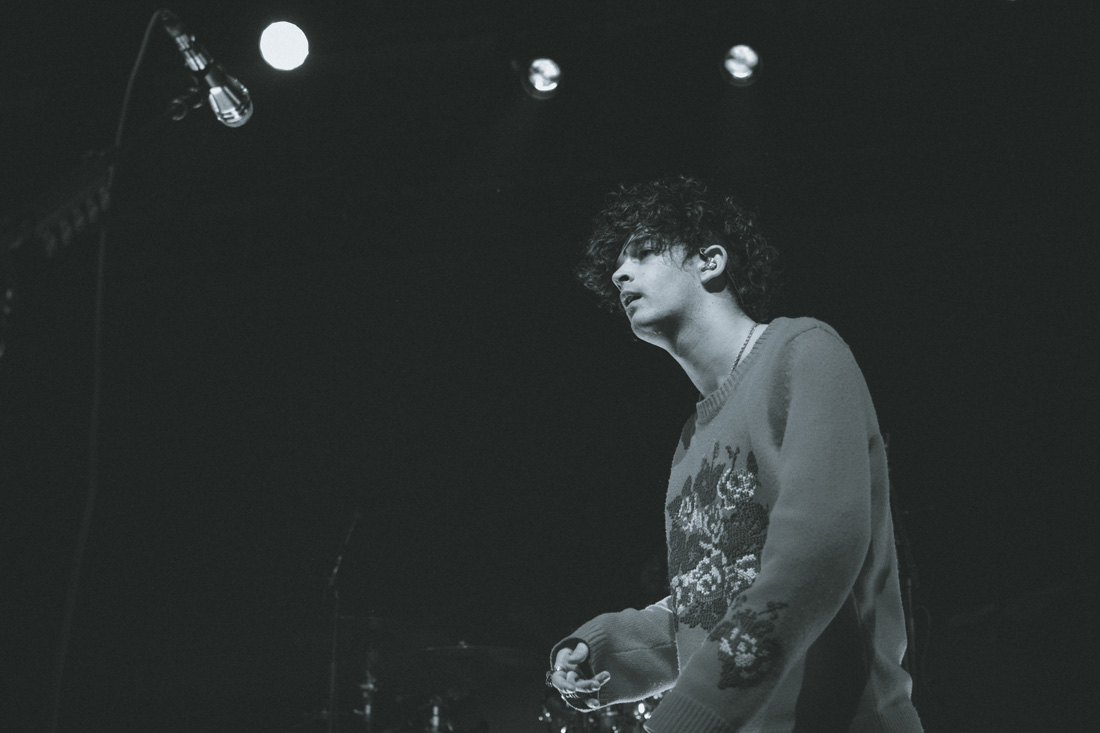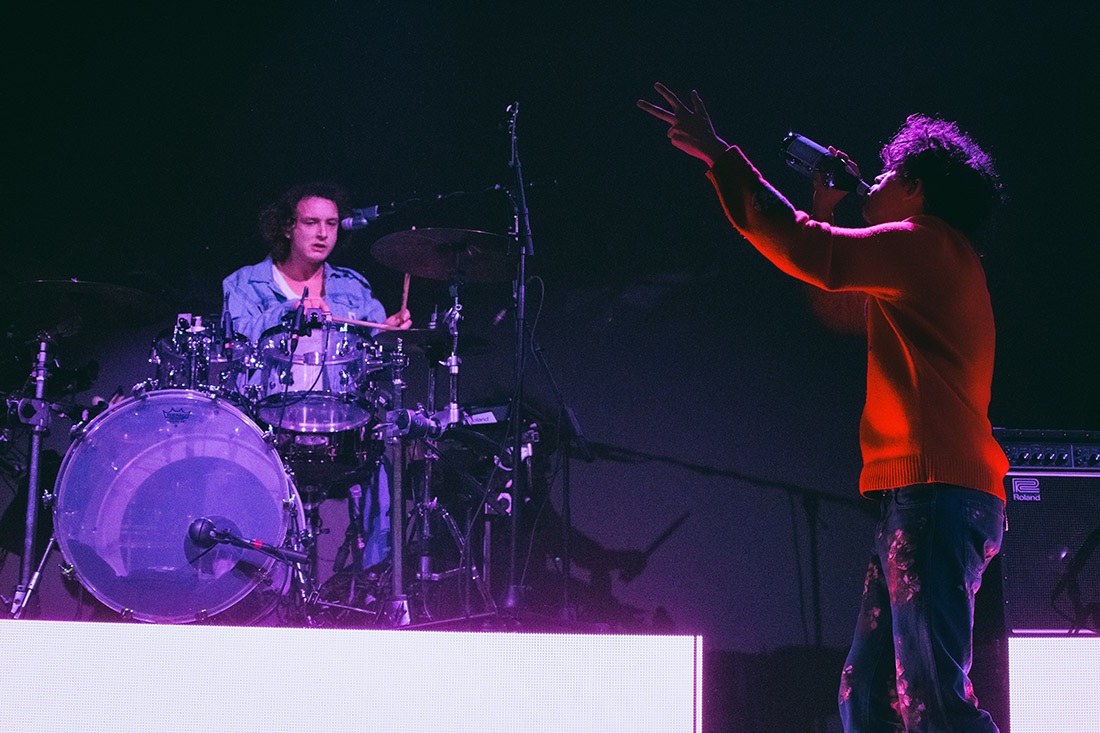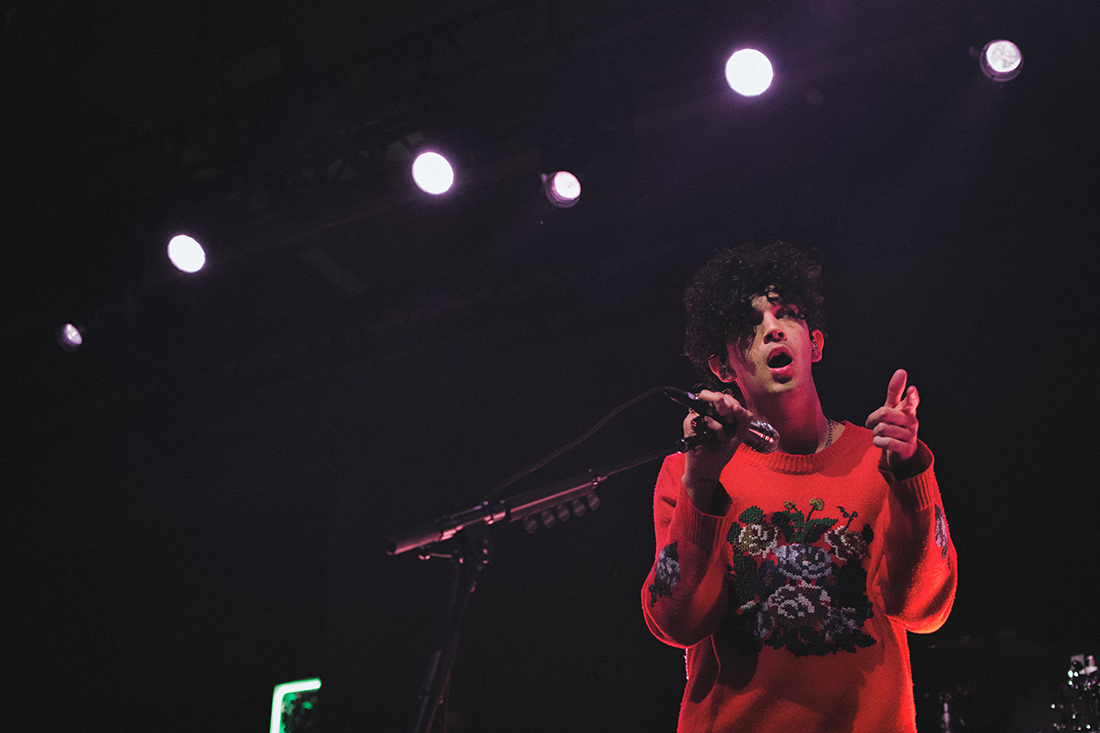After being shot down by every major label in the UK, The 1975 went on to release their debut album on their own label, which entered the charts at #1. After playing together for over a decade, the band had finally seen the global success that frontman Matty Healy was after. Simultaneously on the verge of stardom and mental breakdown, Healy had to regroup off the road and focus on the band’s second album. Taking the road far less traveled, the Brits followed up their debut full-length smash with a 74 minute left-field pop record, which along with its predecessor has topped the charts, and is re-designing the world of pop and alternative music, one die-hard fan at a time.
Interview and Photography by Andy Gorel
Andy: Before receiving any recognition from around the world, the four of you had been playing together as a band in Manchester for years. Manchester has turned out so many unique bands like The Smiths and New Order over the years. How do you feel being from Manchester played into the band The 1975 is or the artist you are?
Matty: I suppose it depends on how much you give to the idea of lineage. For me it wasn’t imperative. It wasn’t important for me. It was a never a thing. I was never trying to be from Manchester. I was never priding myself on being from Manchester. It was merely where I was from. I didn’t really think about it that much.
Andy: Well did the music scene there play into it at all?
Matty: As much as I was into bands like The Smiths and Joy Division, the idea of being in a band of that kind of credibility – by the time I started getting involved in the Manchester music scene, I was about 16 or 17. Everything I was into was either extremely left-field, like American emo, or at the time it was left-field like Rites of Spring, Mock Orange, that kind of thing, or really really left-field electro music from the UK. – I was never thinking, am I following in the footsteps of The Smiths because of course I wasn’t. I just wasn’t.
And then The 1975, we combined our alternative knowledge, our alternative being, with pop sensibilities that were just ingrained within us, and that’s what came out of The 1975. I mean Manchester, it’s important to us, and it’s also not.
“I don’t think the creative process exists without a certain amount of self-doubt. I think that now everyone sees their life with this narrative that you give it.”
Andy: The 1975 got turned down by tons of record labels until Jamie, your manager, finally decided to put your music out on his own label. Starting out as just four boys from Manchester with a passion and a manager who believed in them, what kept you guys together and pushing forward after being turned down so many times? Was there ever any doubt?
Matty: Yeah, there was doubt. Of course, like with everything. I don’t think the creative process exists without a certain amount of self-doubt. I think that now everyone sees their life with this narrative that you give it. Do you know what I mean?
Andy: Yeah, for sure.
Matty: It really feels like a bit of a story now. We started at 13, and kind of said that we were gonna do it, and we’d joke about being this massive band. And whether that time period was naive or deluded, we never really doubted. We got scared when we got turned down, but I think subconsciously we never really doubted. What it was, was by the time The 1975 was a thing, it was so fully formed. The reason all of those EPs came so quickly was because we knew exactly what we were doing.
The idea to keep going was because I couldn’t have the rest of the world know what I had in my head.
Andy: It also had to be frustrating to feel like the record labels were dictating your creativity by turning you down.
Matty: Exactly. I felt like getting signed to this label or that label was the necessary pathway for me to be creative, but it turns out it wasn’t. But it is! Normally. We had to completely subvert it, and take a lot of risks. We had to go against the pre descending idea of how you break a band. We kind of changed it. It was cool.
Andy: So when you guys put out music and started to garner a fanbase of people who genuinely cared, and then eventually continued to grow in popularity, what did it feel like to see success after being told you’re not good enough by the industry? It had to be that much sweeter.
Matty: It just felt like a sense of validation. An emotional sense of validation that everything we were putting in did resonate on that level. And we weren’t stupid either. We weren’t expecting for things to just blow up overnight, but the fact that the small fanbase we had was so hardcore, spoke a lot. In hindsight, it definitely spoke a lot about what was to come, because the intensity has only heightened since then.
Andy: You mentioned how the EPs came quickly because you knew what you were doing. Do you feel that once you guys found your sound and said “This is The 1975” it helped you get noticed when you did emerge, because you were ready? You’d been working for ten years.
Matty: Yeah, definitely! We were kind of late to the game in regards to being a young band. We were 23-24 before we even knew who we were.
Andy: Which there’s nothing wrong with that.
Matty: There’s nothing wrong with that, but it definitely meant we knew what we were doing, and we were ready for it. We’d been through the mill. You know, if you’re still knockin’ around at 24-25 trying to get signed, it gets harder every year.
Andy: So after playing under so many other names, what made “The 1975” standout as the name you wanted to move forward with?
Matty: You know what? A lot of it was about getting sued. We were going to be The Big Sleep, but there was this band from America named Big Sleep and we couldn’t do it. We had seen a band called Brother get sued after their album had come out, and they had to change the album and stuff. It was horrible. So there was a lot of politics, but then what it was, was I never really thought of it. We just had an understanding of what our band was, and The 1975 was the name of this side project that I’d made. When I said why don’t we call it that, and Jamie asked my why, then I told him the story and he was like, “Well that’s the only thing with any kind of value. Let’s use that.”
Andy: So once you did emerge as The 1975, your first album debuted at #1 in the UK. You had been working your whole life for a moment like this, and it happened in just a week. What did that week feel like? Just to be that validating.
Matty: It was mental. I’ve spoken about it quite a bit, saying it brought on this kind of existential crisis where I wasn’t really fulfilled, and I think it was because I had spent my whole life thinking that that’s the moment that would make me happy, and when nothing physically changed. I think it was slightly anticlimactic. I don’t know what I was expecting. I don’t know if it felt undeserving, but it made me feel really big and really small at the same time. It was an interesting time. It catalyzed a period of wanting to be really really creative, and wanting to expand on that, because I felt like if I could achieve a number one album with that album, then what else could I achieve a number one album with?
Andy: Yeah, well that’s kind of human nature – “This is what I’ve accomplished, now what’s next?”
Matty: Exactly.
Andy: Within a year you had already been brushing up against celebrity status. Was it ever frustrating for you to know there were people thinking “Look at Matty Healy, he’s a celebrity now. He’s friends with Taylor Swift” and not just to be known as an authentic pop artist?
Matty: I’ve not really been subject to it that much. Yeah, there was stuff with Taylor Swift, but if Taylor Swift goes into a store, the store becomes famous. So I think it was slightly subject to that. I don’t go out and party that much, and I’m not really on the scene for example. The only thing that people really know about me is my band, and that’s kind of how I keep it. I’ve not had big troubles with the press. I suppose I’ve occasionally been misinterpreted, but that’s just par for course.
Andy: Being misinterpreted, is that something that worries you?
Matty: It doesn’t worry me as much as it kind of annoys me.
Andy: Yeah, that’s a better word for it. Does it annoy you?
Matty: Well, no, because I’m not going to say anything too bad. I don’t think I stand for anything too bad.
Andy: And you’re clearly always honest.
Matty: Exactly. So I’m not really scared of anything, because I live and speak freely. I don’t stand for things that can universally be condemned. I’m not a misogynist, or a racist. You know what I mean?
Andy: Yeah, totally.
Matty: So I may say things that expose my humanity, or make me not look particularly glamorous, or even paint me in a negative light, but that doesn’t scare me because I’d rather be honest than… If I’m going to be asked these questions… You know I didn’t really ask for this. I was making records in my bedroom. So if it’s gonna happen – if people are gonna ask me these questions – then I’m gonna tell them.
Andy: Yeah, even a while ago there was that incident in LA where someone at TMZ got a picture of you hitting a bong or whatever, and it’s like, who cares. It’s not like people didn’t know you’ve smoked before, and nobody really made a big deal about it because you’re always honest about things.
Matty: Exactly.
Andy: There are a lot of people, within your fanbase who go to your shows, and have their phones out, when the show is supposed to be about the music. Does that ever get to you?
Matty: No, I mean I speak about it at show sometimes. Most nights I tell people to put their phones down, not from a place of being annoyed or trying to teach people a lesson, but reminding people that the memory of the experience is going to be far more pertinent than a video. But then again, I also empathize with it because the idea of capturing moments is what life is about, now especially. I know what it’s like to see something, and think, “Oh I need to take a picture of it.” So it doesn’t piss me off cause I’m just as guilty as everybody else. It’s just that I do play shows every night. So by seeing that every night, so I could be pissed off about it, because I see the phone thing every night, but people don’t go to shows every night. They forget, you know?
Andy: For sure.
Matty: So it’s just my job to kind of remind people.
“What it was, was that my band had gone from being stories about my life, that I’d written in my bedroom, to nobody. And then… it was like I had made a career out of my diary, and then I was performing it.”
Andy: Then there was the infamous Boston show… You had been going through a rough patch and snapped at a fan. Do you feel that being on the road for so long, especially with all of the partying, or whatever else may come with it, and constantly having so much attention on your band – Did that make being an artist harder?
Matty: Well, no. I was just going through a personal thing at the time. For a start, like I said, I am very much a character on stage, and I look very interesting. “What’s he up to? What does he do privately?” – these kind of things. There’s not that much about me, and I think the Boston thing, at the time, was just when I was literally a person doing a show every night, and during the day I wasn’t doing anything. And that’s all I was doing. It was the most interest thing that happened. So that’s why there was so much press around it. It wasn’t necessarily a defining moment, mentally and emotionally. What it was, was that my band had gone from being stories about my life, that I’d written in my bedroom, to nobody. And then… it was like I had made a career out of my diary, and then I was performing it. And one night, I was really upset about whatever it may be, and I was being particularly indulgent, maybe I was a bit more drunk than normal or whatever. I think I just kind of felt like, “I’ll tell you what. If you want me to be the clown. If you want me to be the jester. I can do that.” And I just kind of let go. I didn’t necessarily attack anyone or anything. If I felt like I wanted to cry, I was going to cry. If I felt like I wanted to smash something up, I would have smashed something up. I just got it out. That’s all it was. I was just tired.
Andy: The touring life just has to wear you down.
Matty: Exactly.
Andy: After finishing up touring in late 2014, what was it like to finally be off the road, away from the buzz and just alone again?
Matty: The silence was kind of deafening. We’d been writing on the road, and knowing that we were making a new record, but when we transitioned into the time off, making the new album – when that time period actually presented itself, it was kind of overwhelming. It was quite intense. I’d realized how used to touring I had become. Then I wasn’t in a different place every day and I did have these responsibilities. Me and George were living in this shitty flat in West London and it was miserable. It was kind of tainted with some really shitty memories. We just needed to get out of there. Once we got to LA, after a couple of months, things started to kind of brighten up a bit.
Andy: So when you were off tour and you had the album to focus on, do you think the writing process helped you sober up, both mentally and physically?
Matty: Yeah, definitely. Like with everything that I do. I had to take it very seriously. It was amazing. It was a really really loose creative, kind of bender that seemed to kind of set these new rules for what we were doing. It was a really interesting time, and we definitely evolved as people, and as musicians. It was definitely a positive experience, as much as it was difficult.
“Music is paramount for me. There’s nothing better than it. Even if I was on drugs, or doing a lot of drugs, it would only be to heighten the experience of making or consuming music.”
Andy: Do you feel that paired with your addictive personality, and drive to work hard as an artist, making album number two helped stimulate you in a way that allowed you to overcome a lot of your substance abuse problems? Was the music a high of its own kind?
Matty: Yeah, because music is paramount for me. There’s nothing better than it. Even if I was on drugs, or doing a lot of drugs, it would only be to heighten the experience of making or consuming music. Drugs just kind of stem from boredom for me. I just enjoy my own company, and being alone, and doing coasts. I use to do that quite a lot, but I don’t really have time for it anymore. When I’m really really creatively nourished, I don’t really feel the need for anything like that. And at the moment, I’ve got so much that I’m doing.
Andy: That’s good!
Matty: Yeah, it definitely keeps me sane anyway.
Andy: There are clearly a lot of differences between The 1975 and I like it when… whether it’s the color schemes, or the soundscapes, but the feel is undeniably the same. It’s The 1975. Is that what you guys were going for? Different sound, same feel?
Matty: I think that’s just maybe what happened. The only music we’ve ever made has been together. So I think our identity is quite of intangible. We don’t really know – I’m sure there’s a lot of stylistic rules, or sonic beds, that represent The 1975, or things that sound like The 1975, but then you hear it. There are loads of bands that try to sound like The 1975, and they don’t. They’re not really bad bands, but I haven’t heard a good band that claims they sound like The 1975. I think it’s because there are those consistencies like my voice, and the perspective that I talk from. It’s obviously the first guy from the first record to the second one. Cultivating our identity was just staying true to ourselves, and making whatever sounds we wanted – making whatever made us happy. There weren’t any rules.
Andy: For the second record, knowing the whole world was watching, you guys went a route that most signed acts probably wouldn’t go. You released a 75 minute long, left-field pop album. Where did the inspiration for this album come from?
Matty: I think I started to get excited by all of the juxtapositions that existed, or all of the dichotomies that existed within our band. Whether it be, the pop music with lyrics that aren’t more slightly morose, or self-deprecating. I just had the idea of having this postmodern identity of creating in the way we consume – creating music in the way we listen to it. I felt like up until the second album, with everything that we’d put out, we’d kind of bought ourselves a license to be the band that represents that idea. So once we set that precedent, making the record was easy. It was just whatever piece of music turns us on, and we want to replicate, do that.
Andy: Well it definitely sounds like 80s-influenced pop.
Matty: Yeah, there was loads of that. The influences you could say were.
Andy: Yeah, and in the 80s, there was a lot of cheesy pop, but there was also pop that was very intelligent – artists like span style=”text-decoration: underline;”>Peter Gabriel or the span style=”text-decoration: underline;”>Talking Heads.
Matty: Yeah, of course! That’s what I always say.
Andy: After your more recent successes, you have officially achieved celebrity status, and onstage you’re a rockstar, but offstage you’re just Matty from Manchester. While holding such status, do you ever feel it is difficult to portray your genuine intentions to your fans or even the world?
Matty: Yeah, I mean, it’s not really my job. My being genuine, or my kind of credibility, or my integrity, comes from people’s belief. I aspire to people to believe in me through my music. Then the only other thing that they see from me is my performance. In interviews, I’m very very honest, and when I meet people out about in the real world, I’m very polite, and I’m very nice to them. It doesn’t take that much management, if you’re not a dick. It takes a lot of management to not be a dick if you are a dick. I see a lot of management go into that with a lot of people.
I’m very humbled by people who like my music. I don’t get a lot of shit – I mean I probably get a lot of shit on the internet, but I don’t read a lot of the internet. Nobody comes up to me in the street and says “Hey dude, you suck!” Everyone who comes up to me in the street is nice. I do my show, and I go onstage and pretend, and then I come off and I’m back to doing my thing.
Andy: I think there’s something to be said for authentic pop music, and people who do pop because it’s what they want to do.
Matty: Exactly! I’m doing pop music for the art of it.
Andy: And it is an art! So many people overlook it. It’s so intelligent to be able to captivate someone in three minutes with music.
Matty: Exactly. I think pop music is the ultimate context of human creative expression.
Andy: Do you feel your life is easier than many others of the same social status because you invest so much of yourself into your music, and you’re honest in interviews? What people see is what they get.
Matty: Well yeah. Easier than what though? Because I don’t really know any other way of being. Just being yourself – I suppose that does make it easier for me because I have nothing to hide. If I was an artist that with a public image that was very controlled for good reason, then maybe not. I don’t really know.
Andy: Do you find yourself introspectively examining yourself a lot, wondering how the rest of the world actually sees you?
Matty: Yeah, of course. You do do that a lot. But it’s just human nature. It’s human nature to google yourself. I think that that happens in the early days, and then you realize that you can’t control everybody’s opinion, and of course there’s going to be lots of opinions about you. The more people that know about you, the more people there are to talk shit about you. It’s all relative. Do you know what I mean?
Andy: Yeah.
Matty: So it doesn’t bum me out. But of course, like any human being, I think about how I’m perceived.
“The only thing that is actually ever going to happen in this world – you can talk about religion, or you can talk about afterlife, or whatever – the only thing that’s ever going to happen is the relationship or the interplay we have with one another.”
Andy: Yeah I can relate to that for sure. I think especially in the music industry, you constantly are examining yourself. Even if you know you’re a good person, you want other people to think you are too. And it’s not that anyone else’s opinion matters.
Matty: No of course not. The only thing that is actually ever going to happen in this world – you can talk about religion, or you can talk about afterlife, or whatever – the only thing that’s ever going to happen is the relationship or the interplay we have with one another. So to not want to make that as poignant or as beautiful as possible is kind of a waste. So the desire to like people, the desire to have people like you, doesn’t necessarily represent being needy, it just means you like people enjoying themselves. You like people. Yeah – you respect people, and you care about them.
Andy: Is it ever difficult to remain humble, and just let people know that you’re just Matty?
Matty: It’s hard to remain humble and be as sarcastic as I am. A lot of my sense of humor, with people who are close to me, it comes from my ego. It comes from the fact that I’m not a pop star, but a lot of my sense of humor comes from acting like a pop star. Do you know what I mean?
Andy: Yeah, for sure.
Matty: (Laughs) Like I could have interrupted you by saying “Is it hard to remain humble being this fucking amazing?” You know?
Andy: (Laughs) Yes!
Matty: That’s kind of my character. That’s how I deal with the ego of it. It’s hard to make off-the-cuff jokes, and also make sure people know you’re being sarcastic.














